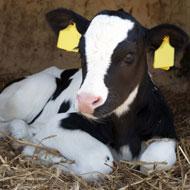Study calls for action on pain relief in calves

Almost all (99 per cent) practitioners surveyed agreed that cattle benefit from receiving analgesic drugs as part of their treatment.
The British Veterinary Association (BVA) has welcomed a new study that supports calls for calves to receive more pain relief during husbandry procedures.
The research, led by the University of Nottingham School of Veterinary Medicine, found that the use of non-steroidal anti-inflammatory drugs (NSAIDs) in addition to local anaesthesia, further controlled pain in calves during procedures like disbudding or castration.
Welcoming the findings, BVA president Gudrun Ravetz said: “Pain recognition, management and treatment of calves during routine husbandry procedures was identified by BVA and British Cattle Veterinary Association as a priority animal welfare problem following the launch of BVA’s Animal welfare strategy last year, and we have been working together closely to progress this issue since.
“So, we welcome these important and timely findings that provide an insight into a critical area of cattle practice and farm animal welfare. We’d strongly urge government, vets, farming bodies and other stakeholders to support the implementation of this study’s recommendations to ensure the highest welfare of the animals we farm.”
The study, published in Vet Record, surveyed some 240 cattle practitioners about their perceptions of pain in their cattle, their use of NSAIDs for a range of 27 different conditions and procedures, and their opinions on acceptable costs for analgesia.
Almost all (99 per cent) practitioners agreed that cattle benefit from receiving analgesic drugs as part of their treatment. The majority (96 per cent) also believed that cattle recover faster if given analgesic drugs.
Interestingly, the study showed that female practitioners and those that graduated after 2010 were more likely to perceive conditions and procedures as painful. Male practitioners and those who graduated before 1990 were more likely to give significantly lower pain scores.
Results revealed that the more painful the condition or procedure, the more likely practitioners would use NSAIDs. However, this was not the case in disbudding and castration in calves, and dystocia and dehorning in adult cattle which, despite being recognised as having a higher pain score, were associated with lower use of pain relief.
John Remnant, clinical assistant professor in farm animal health and production, at the Nottingham Vet School, said: “Overall, the message of this paper is a positive one – it appears that veterinarians’ awareness of pain in cattle and willingness to use analgesics in general has increased over the last decade.
“However, whilst this should be commended, the apparent lack of use of appropriate analgesia specifically in calves undergoing routine husbandry procedures such as castration and disbudding requires urgent action.”



 The Veterinary Medicines Directorate (VMD) is inviting applications from veterinary students to attend a one-week extramural studies (EMS) placement in July 2026.
The Veterinary Medicines Directorate (VMD) is inviting applications from veterinary students to attend a one-week extramural studies (EMS) placement in July 2026.